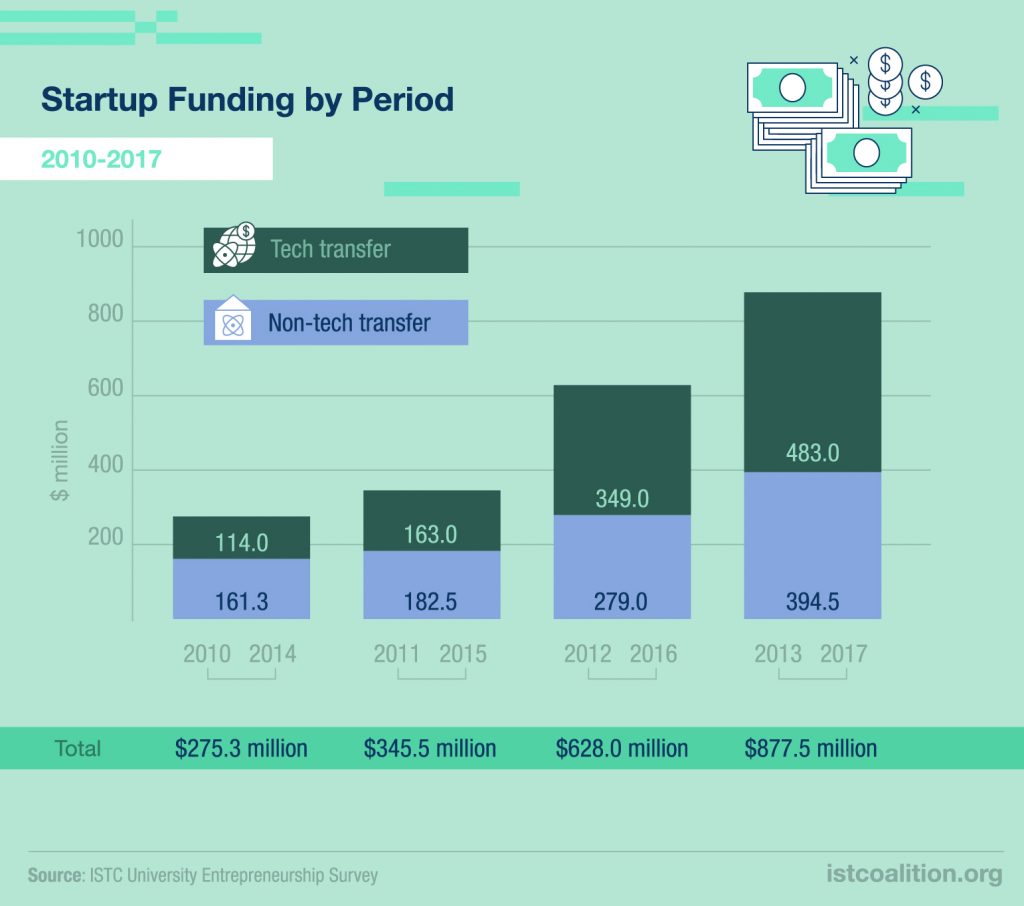Illinois’ universities have long been drivers of economic development and innovation, bolstering the state’s talent pipeline and conducting nearly $2.4 billion in academic research & development activity each year. Over the last decade, Illinois’ universities have also increased their efforts to ensure that innovations made possible by university research are able to reach the commercial marketplace. By doing so, universities drive direct economic impact through innovation and job creation.
In 2013, the Illinois Science & Technology Coalition (ISTC) began tracking technology commercialization and startup activity generated by Illinois’ universities through its Illinois Innovation Index. This year, our 2018 University Entrepreneurship Index highlights unprecedented growth in university-supported startup activity and funding.

Over the past five years, students and faculty of Illinois’ universities have founded 942 startups with the support of university technology licensing, entrepreneurship programs and competitions, and other university initiatives. This volume of startup activity is the largest since our entrepreneurship survey began, when just over 400 startups were spun out of the state’s universities from 2009 to 2013. In addition, over 81 percent of active startups remain in Illinois, the highest level our survey has ever recorded and a credit to the pipeline that has developed between universities and the state’s greater entrepreneurial ecosystem.
As the number of startups spun-out of universities has risen in recent years, so too has the funding those startups have raised. From 2013 to 2017, Illinois university-supported startups raised $877.5 million. This figure has more than tripled since university-supported startups in the state raised $275.3 million from 2010 to 2014.

Startups founded between 2013 and 2017 raised more than $40 million from federal Small Business Innovation Research (SBIR) and Small Business Technology Transfer (STTR) grants, a new high for university startups in the state. More than 100 startups also startups participated in NSF’s I-Corps program, which helps researchers commercialize their innovations. These programs provide a pathway to commercial success for startups, with I-Corps participants 3.5 times more likely to receive SBIR/STTR funding, and SBIR/STTR recipients more likely to remain active and remain in Illinois.
Illinois’ university-supported startups are tackling challenges in a wide range of industries, from therapeutics battling cancer; to novel Internet of Things sensors for crop monitoring; to undersea WiFi for the military and oil and gas industry. Health-related startups—those in biomedical & biotechnology (15.2 percent) and healthcare and social services (8.7 percent)—account for nearly a quarter of all startups. Information, communications, and IT startups accounted for 18 percent of all startups founded over the last five years.

Universities in Illinois are also taking proactive steps to improve diversity and inclusion in entrepreneurship. Over the past five years, 28 percent of university-supported startups in Illinois had at least one female founder—significantly higher than the nationwide figure of 17 percent. The strength of Illinois’ universities also attract talent from around the world, many of whom go on to found startup startups. An estimated 40 percent of university-supported startups have had at least one foreign-born founder. This findings highlights the need to fully implement the International Entrepreneur Rule, which would allow foreign-born founders to stay and growth their companies.
Thanks to an increased level of support for entrepreneurs, as well as connectivity to the state’s innovation ecosystem, Illinois’ universities have established themselves as true incubators of new and promising ventures. To take full advantage of university commercialization and entrepreneurship efforts, stakeholders across the state should look to further develop the pipeline between campus resources and Illinois’ larger entrepreneurship ecosystem. Illinois should also expand strategies to increase access to higher-level startup funding in-state. Finally, universities and the state’s greater entrepreneurship ecosystem should strive to further promote diversity and inclusiveness among underrepresented groups in entrepreneurship. Taking these steps would help ensure that startups catalyzed by Illinois’ universities are able to thrive in the state.
 Mark Harris has served as the President & CEO of the Illinois Science & Technology Coalition and Institute since June 2012. He has more than a decade of experience working in government, economic development and higher education. This includes serving as deputy chief of staff for the State of Illinois, working as associate director for the Polsky Center for Entrepreneurship at the University of Chicago Booth School of Business and serving in senior positions at the Illinois Department of Commerce and Economic Opportunity (DCEO).
Mark Harris has served as the President & CEO of the Illinois Science & Technology Coalition and Institute since June 2012. He has more than a decade of experience working in government, economic development and higher education. This includes serving as deputy chief of staff for the State of Illinois, working as associate director for the Polsky Center for Entrepreneurship at the University of Chicago Booth School of Business and serving in senior positions at the Illinois Department of Commerce and Economic Opportunity (DCEO).
 Matt Bragg is Program Manager for Data and Policy at the Illinois Science & Technology Coalition (ISTC). Matt is responsible for overseeing all aspects of the Illinois Innovation Index – the ISTC’s quarterly data publication tracking and benchmarking the state’s innovation performance. In this role, he manages relationships with Index partners to collect unique data and provide valuable insight on the state’s STEM talent, R&D, and entrepreneurship ecosystems. Matt also oversees ISTC’s policy advocacy efforts in Springfield and D.C., which focus on economic development through effective research & commercialization, entrepreneurship, and immigration policies.
Matt Bragg is Program Manager for Data and Policy at the Illinois Science & Technology Coalition (ISTC). Matt is responsible for overseeing all aspects of the Illinois Innovation Index – the ISTC’s quarterly data publication tracking and benchmarking the state’s innovation performance. In this role, he manages relationships with Index partners to collect unique data and provide valuable insight on the state’s STEM talent, R&D, and entrepreneurship ecosystems. Matt also oversees ISTC’s policy advocacy efforts in Springfield and D.C., which focus on economic development through effective research & commercialization, entrepreneurship, and immigration policies.

